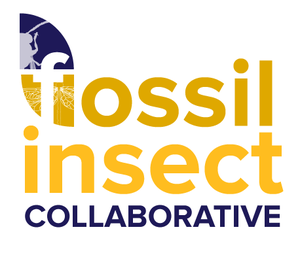Fossil Insect Collaborative: A Deep-Time Approach to Studying Diversification and Response to Environmental Change
Digitization TCN: Fossil Insect Collaborative: A Deep-Time Approach to Studying Diversification and Response to Environmental Change
| Fossil Insect TCN | |
|---|---|
| Quick Links | |
| Project Summary | |
| Current Research | |
| Project Websites | |
| Network Map | |
| Publications | |
| PENs | |
Project Summary
Fossil insects provide a unique deep-time record of ecological and evolutionary response to past environmental changes and therefore are invaluable for understanding the impacts of climate change on the current biodiversity crisis. Given current models of future climate change and the important role that insects play in human society (biodiversity, pests, pollination, vectors of disease) the ability to access these data and make predictions about future insect populations becomes even more urgent. The Fossil Insect Collaborative will make available all the major collections of fossil insect specimens in the United States by creating electronic specimen records consisting of digital images and associated collection data.
The digitized fossil insect collections will be made broadly accessible to the research community, K-16 education, government and industry, the general public, and the media through the project website and a central site integrating all the paleobiological Thematic Collections Networks called iDigPaleo. Mobile apps and activities that allow a wide variety of users to experience and interact directly with the collections data will be developed. This award is made as part of the National Resource for Digitization of Biological Collections through the Advancing Digitization of Biological Collections program and all data resulting from this award will be available through the national resource (iDigBio.org).
Current Research
The fossil insect data are of great importance to understanding insect response to environmental change and patterns of insect biodiversity through time.
These fossils can aid in phylogenetic reconstruction, examinations of the evolution of morphological characteristics, and studies of overall patterns of diversification in deep time.
Digitization of fossil insect collections can support studies related to :
- Pest evolution
- Parasitic insect co-evolution
- Insect pollination
- Insects as vectors of disease
- Gigantism as a result of climate change.
Project Websites & Social Media
Fossil Insect Collaborative Website http://fossilinsects.colorado.edu
iDigPaleo https://www.idigpaleo.org
Facebook: FossilInsectCollaborativeDigitizationProject
Twitter: @FossilInsectTCN
Citizen Science & Outreach Projects
iDigPaleo Teacher Workshop at Yale: Eight middle school and high school teachers joined FIC PIs and educators at the Yale Peabody Museum on July 20 and 21, 2015 to work with the iDigPaleo database/web page and develop curricula using iDigPaleo in the classroom.
Project Leadership
Project Sponsor: University of Colorado at Boulder (NSF Award 1305066)
Principal Investigators (PIs): Dena Smith (PI), Talia Karim (Co-PI)
Collaboratoring Award PIs:
Sam Heads, University of Illinois Urbana-Champaign; David Grimaldi, American Museum of Natural History; Alton Dooley, Virginia Museum of Natural History; Michael Engel, University of Kansas; Brian Farrell, Harvard University; Susan Butts & Christopher Norris, Yale University; Diane Erwin, University of California, Berkeley
Project Collaborators
Map of Collaborating Institutions
American Museum Natural History (NSF Award 1304943)
Harvard University (NSF Award 1304992)
University of Illinois at Urbana-Champaign, Illinois Natural History Survey (NSF Award 1304622)
University of Kansas, Center for Research (NSF Award 1304957)
Virginia Museum of Natural History (NSF Award 1304956)
Yale University - Peabody Museum (NSF Award 1305027)
Unfunded participants:
National Museum of Natural History
Florissant Fossil Beds National Monument
Protocols & Workflows
Amber Preparation Workshop: TCN members met at the AMNH on the 27th and 28th of February, 2015 to discuss digitization progress and learn how best to prepare and image specimens preserved in amber. AMNH project members David Grimaldi and Paul Nascimbene provided the group with an overview of amber and insect inclusions, and also gave tours of the collection, lab space, and equipment needed to properly prepare and preserve amber.
Publications
Arillo, Antonio, Enrique PEÑALVER, Ricardo PÉREZ-DE La Fuente, Xavier DELCLÒS, Julia Criscione, Phillip M. Barden, Mark L. Riccio, and David A. Grimaldi. “Long-Proboscid Brachyceran Flies in Cretaceous Amber (Diptera: Stratiomyomorpha: Zhangsolvidae).” Systematic Entomology 40 (2015): 242–67. doi:10.1111/syen.12106.
Heads, Sam, M. Thomas, and Yinan Wang. “A Remarkable New Pygmy Grasshopper (Orthoptera, Tetrigidae) in Miocene Amber from the Dominican Republic.” ZooKeys 429 (2014): 87–100. doi:10.3897/zookeys.429.8020.
Professional Presentations
iDigBio Summit V, 2015
iDigBio Summit IV FIC TCN Lightning Talk
Other project documentation
PENs
Digitization PEN: Partnership to the Fossil Insect Collaborative for Collections at the University of California Museum of Paleontology
The University of California, Berkeley Museum of Paleontology (UCMP) will join the Fossil Insect Thematic Collections Network (TCN) dedicated to understanding the impacts of environmental change on insect diversity and evolution using paleontological data. The project will expand the TCN's current geographic coverage providing researchers and the public with web-accessible digitized images and specimen records of approximately 4,900 Cenozoic insects that lived during times of significant climate change. These specimens include insects in amber, a rare insect assemblage from the Great Basin, and Ice Age insects from southern California's Rancho La Brea and McKittrick tarpits.
Addition of these specimens to the Fossil Insect TCN will enhance datasets for analyzing how these climatically-sensitive organisms have responded to abrupt environmental changes throughout Earth history, and the implications of climatic warming on present-day biodiversity. Students at UC Berkeley will perform the digitization while learning about the value of natural history collections and their relevance to science. Project data will enhance UCMP's K-16 teacher-student science education programs, global public outreach, and Internet resources. Input from local communities will assist in developing "DigIt", a mobile application for researchers, teachers and students, members of industry, government agencies, and the public. This award is made as part of the National Resource for Digitization of Biological Collections through the Advancing Digitization of Biological Collections program and all data resulting from this award will be available through the national resource (iDigBio.org).
Project Sponsor: University of California-Berkeley (NSF Award 1503671)
Principal Investigators (PIs): Diane Erwin
